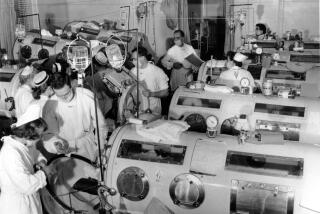Developments in Brief : Vaccinated Monkeys Protected in AIDS Test
- Share via
An experimental vaccine based on the polio vaccine has protected monkeys from a deadly AIDS-like virus for more than a year, scientists at the University of California, Davis, report.
“It worked even better than we thought it would,” said Dr. Preston Marx, a virologist at the California Primate Research Center and head of a 13-member research team.
He said the year-old study compared six vaccinated monkeys with six others not given such protection. All were then injected with a lethal dose of the simian acquired immune deficiency syndrome (SAIDS) virus.
None of the inoculated monkeys has shown any signs of infection. Three of the comparison group are now dead, and the others show signs of exposure. The 50% mortality rate in infected monkeys is typical of the virus over a yearlong period, Marx said.
“I think the Davis results represent a very clear step in the direction of determining if a retroviral vaccine will help with AIDS,” said Dr. Jay Levy, a UC San Francisco researcher and one of the first to isolate the human AIDS virus.
In a separate AIDS-related development, a report in the current issue of the New England Journal of Medicine says that the disease can damage the human heart, as well as the brain and lungs.
Dr. Ira S. Cohen of Walter Reed Army Medical Center described three cases in which AIDS victims died of heart trouble that apparently resulted from their infections. In each case, there was evidence of direct damage to the heart muscle, a condition known as cardiomyopathy.
“These cases suggest a need for considering clinical and subclinical cardiac dysfunction as a complication of AIDS,” he said.






